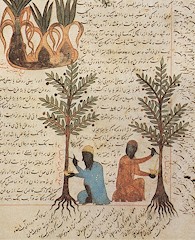Arab Agricultural Revolution
Arab Agricultural Revolution refers to the transformation in agriculture from the 8th to the 14th century in the Islamic world, during the Islamic Golden Age. This period was marked by significant advancements in agricultural practices, including the introduction of new crops, improved irrigation techniques, and a more scientific approach to farming. These innovations not only increased food production but also had a profound impact on the social, economic, and cultural aspects of the Islamic societies.
Origins and Development[edit | edit source]
The Arab Agricultural Revolution began in the Middle East, particularly in areas under the control of the Umayyad and Abbasid caliphates. It was influenced by earlier agricultural practices from various civilizations, including the Persians, Ancient Egyptians, and Romans. The Muslims inherited these agricultural traditions and significantly improved upon them through innovation and the integration of knowledge from the many cultures within their empire.
Key Innovations[edit | edit source]
One of the most significant contributions of the Arab Agricultural Revolution was the introduction of new crops to the Islamic world. These included staples such as rice, sugar cane, cotton, and citrus fruits, which were imported from Asia and Africa. The diversification of crops led to enhanced food security and the foundation for a thriving economy.
Irrigation techniques saw substantial improvements during this period. The Arabs developed sophisticated systems, such as the qanat and norias, which allowed for the expansion of agriculture into arid regions. These innovations not only maximized water usage but also supported the cultivation of a wider variety of crops.
The Arab Agricultural Revolution also introduced the concept of crop rotation, which improved soil fertility and yield. This practice, combined with the use of animal manure for fertilization, greatly enhanced agricultural productivity.
Impact[edit | edit source]
The agricultural innovations of the Arab Agricultural Revolution had a lasting impact on the Islamic world and beyond. Increased food production supported population growth and urbanization, leading to the development of vibrant cities such as Baghdad, Cordoba, and Cairo. The economic prosperity from agriculture funded scientific research, education, and the arts, contributing to the flourishing of the Islamic Golden Age.
The agricultural practices and technologies developed during this period were later transmitted to Europe, significantly influencing the agricultural revolution in the West. This exchange of knowledge was facilitated through the Reconquista and the Crusades, as well as through the translation of Arabic texts into Latin.
Conclusion[edit | edit source]
The Arab Agricultural Revolution was a pivotal event in the history of agriculture, marking a period of extensive innovation and growth. Its contributions to farming practices and technology had a profound effect on the Islamic world and laid the groundwork for future agricultural advancements in Europe and other parts of the world.
Search WikiMD
Ad.Tired of being Overweight? Try W8MD's physician weight loss program.
Semaglutide (Ozempic / Wegovy and Tirzepatide (Mounjaro / Zepbound) available.
Advertise on WikiMD
|
WikiMD's Wellness Encyclopedia |
| Let Food Be Thy Medicine Medicine Thy Food - Hippocrates |
Translate this page: - East Asian
中文,
日本,
한국어,
South Asian
हिन्दी,
தமிழ்,
తెలుగు,
Urdu,
ಕನ್ನಡ,
Southeast Asian
Indonesian,
Vietnamese,
Thai,
မြန်မာဘာသာ,
বাংলা
European
español,
Deutsch,
français,
Greek,
português do Brasil,
polski,
română,
русский,
Nederlands,
norsk,
svenska,
suomi,
Italian
Middle Eastern & African
عربى,
Turkish,
Persian,
Hebrew,
Afrikaans,
isiZulu,
Kiswahili,
Other
Bulgarian,
Hungarian,
Czech,
Swedish,
മലയാളം,
मराठी,
ਪੰਜਾਬੀ,
ગુજરાતી,
Portuguese,
Ukrainian
Medical Disclaimer: WikiMD is not a substitute for professional medical advice. The information on WikiMD is provided as an information resource only, may be incorrect, outdated or misleading, and is not to be used or relied on for any diagnostic or treatment purposes. Please consult your health care provider before making any healthcare decisions or for guidance about a specific medical condition. WikiMD expressly disclaims responsibility, and shall have no liability, for any damages, loss, injury, or liability whatsoever suffered as a result of your reliance on the information contained in this site. By visiting this site you agree to the foregoing terms and conditions, which may from time to time be changed or supplemented by WikiMD. If you do not agree to the foregoing terms and conditions, you should not enter or use this site. See full disclaimer.
Credits:Most images are courtesy of Wikimedia commons, and templates Wikipedia, licensed under CC BY SA or similar.
Contributors: Prab R. Tumpati, MD




